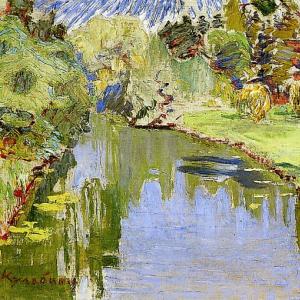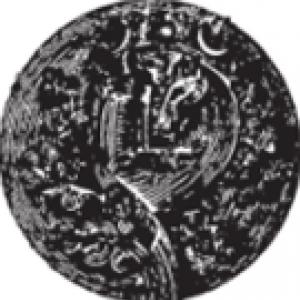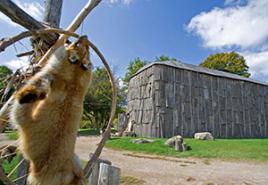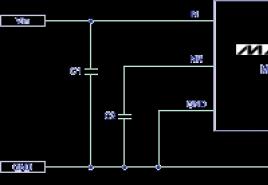Who wrote it smelled like winter cold. "First Snow" I
It smelled like winter cold
To the fields and forests.
Light up bright purple
Before sunset the sky.
At night the storm raged,
And with dawn to the village,
To the ponds, to the deserted garden
The first snow started to fall.
And today over the wide
White tablecloth fields
We said goodbye belatedly
A string of geese.
Analysis of the poem “First Snow” by Bunin
“The First Snow” is a poem that belongs to the poet’s early work. Bunin writes about the onset of winter and sadness about the passing warm days. The author spent his childhood in the village, so he learned to notice the beauty of nature.
The work describes how at night winter fights for its rights and in the morning white snow covers the fields. This becomes clear from the first stanza. The aroma of frosty freshness wafts all around. The sky is painted crimson. Everything is described in understandable speech, because there is the presence of the lyrical hero. The verse consists of three parts, each with a specific meaning.
Changes in nature are felt. Using objective epithets, it seems that all natural phenomena are happening at the present moment. From the very beginning there are the first signs of winter. This is noticeable by the frosty freshness in the fields and forests, and the color of the sunset. Thus, the onset of real winter is foreshadowed.
After reading the second stanza, you can notice some anxiety. In this part, observing changes in nature, the poet waits for the first snow to fall. But he’s not the only one languishing in anticipation. Nature also anticipates this. The leaves have fallen from the trees and there are no flowers to be seen. The fields and gardens were empty. Everything is ready for the onset of the cold season.
In the third part, expectations are met. At night you can hear a storm, and when dawn breaks, you can see flying snow flakes. There is a farewell to autumn, which is emphasized by a belated line of geese. The hero becomes a witness who observes the change of seasons.
Describing the arrival of winter, the hero’s positive attitude and his dream of transforming the world become noticeable. He sees this as a bright holiday and accepts life in all its manifestations.
There is a feeling of sadness in the last lines. The poet is a little sad about the past warm days. But they will be back soon. And events and time itself will no longer be able to return. This is what makes me feel a little sad. The past days are expressed with the help of a string flying away into the distance.
The combination of red and white colors makes it easier to describe, showing the involvement of natural phenomena in the worldview of the lyrical character. He is part of nature. This is evidenced by his use of the pronoun “we”.
Bunin's poem conveys moving nature, its life, and makes one think. The illusion that actions are happening right now is skillfully demonstrated. It is clear how much the author loves his native land.
View document contents
“Analysis of Ivan Bunin’s poem “First Snow””
Analysis of Bunin's poem "First Snow"
The poem “First Snow” dates back to the early period of Ivan Bunin’s work, which today is considered a textbook and is included in the primary school curriculum. This is not surprising, since it is written in a very simple and accessible language.
At the same time, the work contains imagery that allows you to vividly imagine the arrival of winter.
It has not yet come into its own, but from indirect signs the author unmistakably guesses its approach.
There is already a smell of frost in the air and “the skies lit up bright purple before sunset,” which indicates an upcoming cold snap. The poet’s assumptions are justified, as a snow storm begins at night. However, she does not frighten young Bunin, who is looking forward to such changes and dreams of the whole world being transformed. Indeed, “at dawn the first snow fell on the village, on the ponds, on the deserted garden.” In this simple phrase, the author managed to fit not only his expectations, but also showed that trees and ponds are also ready for the arrival of winter. A few hours will pass, and a “white tablecloth” of snow will cover the bare fields, bringing a feeling of light and celebration to nature. Only the belated string of geese, with which the author says goodbye on the first day of winter, indicates that just yesterday the world was completely different. However, this does not frighten the poet at all,
After all, the transformation of nature during this period of the year is so natural and harmonious that it evokes in the soul only a slight feeling of bitterness due to the fact that time runs so inexorably and every year it only speeds up its pace.
At the same time, Bunin gratefully perceives the arrival of winter, which in his eyes has a special charm. The poet associates it with an eternal holiday, light and purity, which leave a taste of nostalgia and are associated with a carefree childhood, when the author was truly happy, free from obligations and freed from the need to live according to the laws of adults.
To use presentation previews, create a Google account and log in to it: https://accounts.google.com
Slide captions:
I dusted the paths and decorated the windows. She gave joy to the children and took them for a ride on a sled. Invisible, carefully He comes to me And draws, like an artist, He draws patterns on the window. The fluffy carpet is not woven by hand, not sewn with silk, in the sun, in the moon, the village glitters with silver in white velvet - both fences and trees. And when the wind attacks, this velvet will fall off. I walk in the field, I fly in freedom, I spin and mutter, I don’t want to know anyone. I run along the village, sweeping up snowdrifts. White grandfather, nothing whiter. Old, hunchbacked, lying near the hut. It lies all winter - No one will pick it up. Spring will come - He will leave on his own. In cold weather it lies, in warm weather it runs, Transparent, not glass, If you warm it up, you won’t have time to collect it.
I. Bunin First snow.
Ivan Bunin was born on October 10 (22), 1870 in Voronezh, where he lived the first three years of his life. Later the family moved to the Ozerki estate near Yelets. Until the age of 11, he was raised at home. In 1881 he entered the Yeletsk district gymnasium, in 1885 he returned home and continued his education under the guidance of his older brother Julius. I did a lot of self-education. At the age of 17 he began to write poetry, and in 1887 he made his debut in print.
Bunin was awarded the Pushkin Prize three times. On November 1, 1909, he was elected honorary academician of the St. Petersburg Academy of Sciences. Died in his sleep from November 7 to 8, 1953 in Paris. He was buried in a cemetery in France.
Plastov "First Snow"
The winter cold smelled on the fields and forests. The skies lit up with bright purple before sunset. At night the storm raged, And with dawn, the village fell, The fields, the deserted garden fell with the first snow... And today, over the wide White tablecloth of the fields, We said goodbye to the belated String of geese.
the fields smelled of the white tablecloth, the skies lit up with bright purple before sunset. with a belated line of geese.
http://childline.ru/zima.shtml http://www.nanya.ru/articles/10515.html http://900igr.net/kartinki/literatura/Bunin/Biografija-Bunina.html http://www .pixnet.ru/wallpapers/390fd2727f907293c989d82b9a0fe3bc/2700_5.jpg http://www.welldes.com/animation2.htm
On the topic: methodological developments, presentations and notes
Presentation by N. Rubtsov "First Snow"
The presentation was created based on the poem “Singing Snow” by N. Rubtsov. You can insert music by P.I. Tchaikovsky "December"...
outline for a 3rd grade reading lesson on the section “Snow flies and sparkles.” Drozhzhin "Snow flies..", Balmont "Snowflake", Yesenin "Powder".
Lesson topic: S. Drozhzhin “Snow flies...”...
Winter in the works of Robert DuncanIt smelled like winter cold
To the fields and forests.
Light up bright purple
Before sunset the sky.
At night the storm raged,
And with dawn to the village,
To the ponds, to the deserted garden
The first snow started to fall.
And today over the wide
White tablecloth fields
We said goodbye belatedly
A string of geese.
I. Bunin



Mother! look from the window -
You know, yesterday it was not for nothing that there was a cat
Wash your nose:
There is no dirt, the whole yard is covered,
It has brightened, it has turned white -
Apparently there is frost.
Not prickly, light blue
Frost is hung along the branches -
Just take a look!
Like someone too shabby
Fresh, white, plump cotton wool
I removed all the bushes.
Now there will be no argument:
Over the skids and up the hill
Have fun running!
Really, mom? You won't refuse
And you yourself will probably say:
“Well, hurry up and go for a walk!”
A. Fet



Our windows are brushed white
Santa Claus painted.
He dressed the pole with snow,
The garden was covered in snow.
Shouldn't we get used to the snow?
Should we hide our nose in a fur coat?
As soon as we come out, we shout:
- Hello Dedushka Moroz!
Let's ride and have fun!
Light sleds - take off!
Who will fly like a bird
Who will curl up right in the snow.
The snow is fluffy, softer than cotton wool,
Let's shake ourselves off and run.
We are funny guys
We don't shiver from the cold.
L. Voronkova





Klen shakes his head:
- Give me the mittens!
- Congratulations on winter! -
The tits whistled.
White yard, white garden,
White paths.
And they hang under the roofs
Blue earrings.
The sun looked into the face -
Almost blinded me!
Blizzard on the porch at night
She came to cry.
And the magpie is at the gate
Spreads rumors
What are they flying into our garden?
Blue flies!
Only such a gossip
We no longer believe.
There's a lot of frost outside -
Close the doors.
The sleds are asking to go for a walk,
The skis creaked.
And he climbs into the stove to sleep
Our kitten is red.
He is not a sledder
And he doesn't ski.
It only warms the paws.
He can do this!
A. Krylov







Robert Duncan was born in Utah and began drawing at age eleven. He spent every summer on his grandparents' ranch in Wyoming, observing nature and rural life. It was his grandmother who gave him a set of oil paints when she noticed the boy’s abilities. While attending the University of Utah, he worked as a commercial artist. He then devoted his creativity entirely to the visual arts of the American West. He took part in art exhibitions and received prizes for the best works.
Robert, his wife Linda and six children live on a ranch in Utah.







